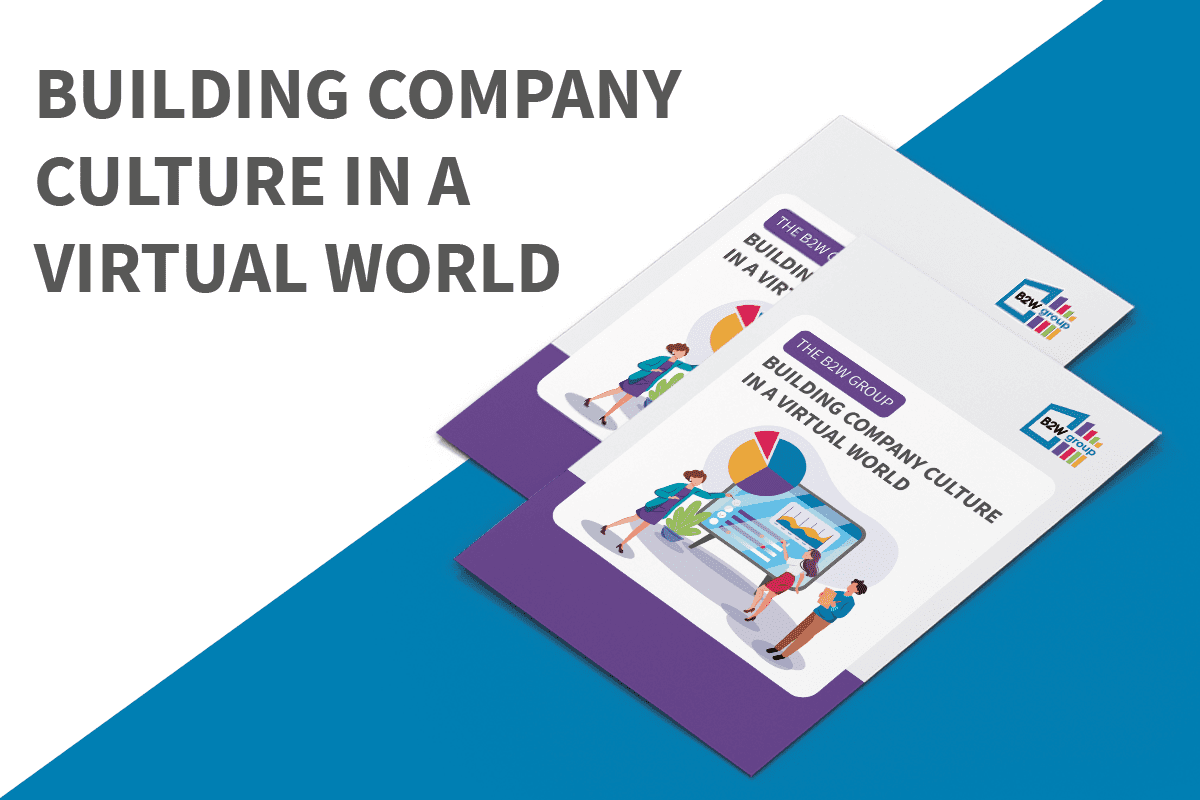Building company culture in a virtual world

“A strong company culture”; “Friendly working environment”; “Fun, exciting and fast-paced workplace”; “A forward-thinking company”; “An open and collaborative team”; “Free tea and coffee” – these kinds of lines pop up regularly in job adverts and they’re designed to demonstrate a company’s culture in order to attract talent.
But do they actually mean anything? And, more importantly – do they hold any relevance in the “new normal” virtual/remote/hybrid careers that exist in 2022?
72% of job seekers say it’s extremely or very important to see details about company culture
What is company culture?
In a nutshell, culture is the measure of how well company values are adhered to and reinforced in an organisation. Therefore, culture can only be maintained if values a) put in place, b) communicated effectively to all staff, c) reinforced throughout the company, and d) linked to the performance and development of employees.
Company culture is important because it affects how your employees and customers perceive you. And this greatly determines how successful your business will be.
When a company lives up to its core values, its culture will transform employees into advocates, enrich their wellbeing, and ensure the company retains its top talent, while attracting the same from its rivals.
It’s key for an organisation to put genuine thought into creating company values – perhaps by measuring what works and what doesn’t, or by taking a poll from current staff on what they value).
Second, an organisation needs to articulate these values by doing more than just dropping them at the bottom of the About Us page on their website – they need to be formally and informally) front-of-mind (company computer backgrounds is one example of this).
Third, company values need to be consistently referenced, rather than just become tick-boxes during performance reviews – they could be re-visited at the beginning of a project (to ensure things stay on track), and reflected upon at the end. Finally, employees that engage with an organisation’s values should be rewarded by having them linked to their progression and development within their role – employees who demonstrate the company value of “continuous improvement” should be rewarded with progression for demonstrating such.
Company culture is more important now than it has ever been.
In offices, culture usually evolves organically through team activities, collaboration, and other “real world” shared experiences. Even “office banter” helps build culture – not only for long-term staff who use this to fulfil their social quota, but also for employees who look to the behaviour of experienced staff to shape their own “banter level”.
Without these real-world opportunities, organic culture becomes almost impossible. So in an organisation based around fully-remote or hybrid working, the building of company culture is essential to the success of the business and its employees.
When March 2019 brought Covid-19 into our lives, most companies who weren’t already remote-based focused on survival (and understandably so). So if 2020 and 2021 were about reacting to an extraordinary situation by focusing on short-term improvements to culture and working arrangements, 2022 is about cementing these changes permanently in business strategy and operations.
Because the simple fact is that remote and hybrid working is here to stay. Over 70 per cent of workers want flexible remote work options to continue and with major (globally successful) companies such as Google, Amazon, Facebook, Microsoft and Salesforce offering such “benefits”, all businesses need to (in some way) follow suit in order to stay relevant and become the “employer of choice” for the top talent out there.
This means leaders will need to create, foster and nurture culture when people are working in multiple places. Not an easy task. But workers are adaptable, businesses are resilient, and cultures (with a bit of tweaking) will survive, providing it is given a real focus at all levels – created from the top, enforced by Managers and Team Leaders, supported by HR, communicated by Marketing, and engaged with by Employees.
So the question becomes: “How do you build a remote culture?”
Creating a remote company culture.
“You can’t please everyone” – in some ways that’s very true. We’ve talked about how employees crave remote work, but that doesn’t mean the office has had its day. While some workers are happy to work from home, a remote-working environment isn’t for everyone.
Some employees may house-share or not have a dedicated working space. Others may simply want to keep personal and business lives completely separate. For these people, office-based or hybrid working could be preferable.
At the same time, some business departments (such as Sales) often thrive in a bustling, competitive, energetic workplace.
Whatever the work model (office-based/hybrid/fully-remote), the key word is communication.
When a colleague isn’t in front of you, many turn to email to get their message across, and sometimes that’s fine. But it’s key to ensure communication is delivered across various channels both formally and informally.
Let’s start from the top: in an office, even entry-level employees are likely to have seen or encountered the directors or CEO; this isn’t the case for fully-remote workers. So it’s key to ensure formal communications come from the top in form of email updates and remote company-wide conferences. This will go some way to helping remote workers feel “part of something bigger”, even though their work social circle probably only consists of less than a dozen people.
Here at The B2W Group, we conduct yearly conferences to update all employees on goings-on, and a quarterly newsletter affords all departments to update on their successes throughout the year. On top of that, our “Ask the MD” feature affords employees the chance to ask The B2W group’s Managing Director Luke Muscat questions about the business and its future.
Moving down to Managers, it’s key to see leaders engage with their teams as much as possible, either by phone or video call. This could be done by daily or weekly team catch-ups, or simply by encouraging managers to use video calls to brief their employees on tasks rather than sending emails.
The B2W Group’s managers are encouraged to engage with their teams through multiple mediums. In Marketing for example, two weekly meetings are held: one on a Monday to catch up on any exciting weekend activities and to set the scene for the week ahead, and one on Friday to recap and reflect on the week’s work and ensure any loose ends are tied up before the weekend.
Finally, peer-to-peer communication is also vital to help employees feel part of an organisation, being one of the key ways office-based workers build their work social circles (you can’t only be so friendly with your boss, so building relationships with those on your level is also important).
Leaders should encourage social interactions between workers and make it clear that video tools such as Zoom and Teams are not only for formal meetings, but can also be utilised for “how was your weekend” conversations between peers. What’s to stop two team members dialling into a 4-hour call first thing in order to create a buddy system for the day?
Here at The B2W Group, staff communicate through a variety of tools, including MS Teams, email, Sharepoint, Slack, telephone and more. Across our business in 2021, over 71,000 calls were made internally on MS Teams, highlighting just how useful these remote communication tools can be. In Marketing, the more everyday casual conversations occur via Slack chat, which allows for team-wide collaborations and engagement.
Company values
When it comes to remote and hybrid working environments, you can no longer rely on the “office buzz” to build culture. There’s no office vibe, coffee runs, or Spotify playlists. So instead, culture is written down in the form of company values, and defined by what leadership teams to reinforce those values.
When looking at the new values of an organisation based around remote or hybrid working, it’s useful to address the concerns and anxiety around this “new normal”.
Many workers unused to working from home may feel a heavy expectation to always be available during work hours. Tools such as MS Teams, Zoom, and Slack are certainly invaluable for remote working, but can also be used by the micromanagers of the world to monitor and track an employee’s online/away/offline status.
It’s the job of managers to make it clear that there’s no expectation to pick up a call the second it rings. Sometimes people are busy, or in the middle of another call, or grabbing lunch, or carrying out one of the many other daily necessities (let’s be honest – toilet breaks at home are far more comfortable than in the office!).
While “I’ll call you when I’m free” is acceptable, scheduling meetings rather than dropping in unexpected could be useful. Or maybe a courtesy message to see if a person is free will do the task.
Other anxieties may be around dress-code – few companies who adopt a business or smart-casual dress-code in the office are likely to enforce the same at home. But this policy leaves employees unsure whether they should be defining their own level of “appropriate” or feel comfortable wearing their pyjamas during meetings.
A very simple but effective way of relaunching remote culture is to have (in writing) a dress-code for an organisation so that workers know what is expected. Whether it’s a company uniform, smart-casual, or even the absence of certain clothing items (hoodies, t-shirts etc), this all helps put employees at ease.
At The B2W Group, we moved towards the option between our current “smart casual” dress code and branded company t-shirts, hoodies, and jackets, provided for by The B2W Group. This not only gave employees the option of what to wear, but also provided clarity around what presentation was expected, and encouraged staff to feel part of the organisation even while working from home. We found that the majority moved away from smart casual and adopted the company “uniform”.
By having clear, defined company values, employees should be able to do away with these associated work-from-home anxieties.
At The B2W Group, we re-launched our new company values at the start of 2022.
Following 2020’s Covid-19 lockdowns forcing a more remote way of working, late-2020 saw the Senior Management Team come together to look at The B2W Group’s previous company values and assess their relevance in the new more-remote/hybrid way of working we planned to pursue in 2022 and beyond. It was also key to ensure values were in-line with the larger company mission of growth and quality.
“Our values are about what we believe in,” said The B2W Group’s Managing Director Luke Muscat. “We were keen to have a set of values which weren’t just graphics on a meeting room wall, but something that we actually worked to integrate into our business.
“It’s a message to internal staff as well as the outside world about what we stand for and how we want to act and conduct ourselves. It’s a statement of intent about where we want to be, how we want to progress, how we want to act, and how we want to behave. It’s a forward-looking message of intent.”
By challenging our values, the team were able to refine them and streamline the message delivered to employees. And so as 2022 began, our values were re-defined:
Ambitious – We are ambitious about what we can achieve and the impact our services can have on people. We empower both our colleagues and customers with the tools and support to reach their full potential, positively challenging each other to grow and develop.
Continuous Improvement – We believe continuous improvement is the key to long term success both for individuals and collectively for us as an organisation. We strive for excellence in the quality of our services, and we operate in an ongoing cycle of review, reflect, and improve.
Pride – We take personal ownership for delivering excellence to both our internal and external customers. We hold ourselves accountable to high standards and we are proud of what we do both as an organisation and as individuals.
People First – We take the wellbeing of our colleagues, customers, and partners seriously. We value diversity, always showing respect towards other people and approaching our work and responsibilities from a position of care and compassion towards others.
In-line with the tips and thoughts above, the new values were introduced by Luke Muscat, The B2W Group’s Managing Director during our 2021 End of Year Conference.
With a large in-person meeting unfeasible, this company-wide meeting was delivered online, and saw Luke Muscat speak about the previous year’s success and give insight into the year ahead. The Senior Management Team also gave insights into their own teams and departments, with leaders from Quality, Human Resources, Marketing and provision heads all taking the stage.
This platform ensured that all staff members were able to “see the company” and gain an insight into the larger business that they never see the other 364 days of the year.
Q&A sessions, along with employee awards based around our new company values, enabled 2022 to kickstart the latest wave of The B2W Group on a positive, forward-thinking note. At The B2W Group, progression and performance have always been at the forefront, with regular 121s and reviews conducted throughout the year. With the launch of our new company values, employee reviews were tailored to complement these. Employees were encouraged to engage with the values and to demonstrate ambition, continuous improvement, pride and people first – formal performance reviews are now conducted based on an employee’s ability and willingness to demonstrate these qualities in all aspects of their work
A look ahead
Remote and hybrid working environments are here to stay. Surveys conducted by CIPD, the professional group for human resources staff, showed that two-thirds of companies have developed a hybrid work model where people spend only part of the time in the office. About 71% of employers said having staff at home either boosted productivity or made little difference.
“The pandemic has shown that ways of working that previously seemed impossible are actually possible,” said Claire McCartney, senior policy adviser for resourcing and inclusion at CIPD.
The Covid-19 pandemic triggered a world-wide experiment into a) the ability of workers to deliver their best work from home, and b) the trust of organisations to allow their workforce to perform away from the physical watchful eye of managers.
The experiment proved that both employees and businesses have found a happy middle ground and that flexibility is king.
As people around the world actively seek roles that allow them the flexibility they’ve become so used to, organisations continue to flex and adapt in order to retain and recruit the best talent in the market. Interviewees are now asking questions about remote and hybrid flexibility, while employers are adding formal work-from-home policies to contracts.
Organisations need to ensure they are promoting their “new normal” remote/hybrid way of working just as they would any other benefit. That means talking about it on company websites, ensuring Marketing is behind the shift, and encouraging current staff to be advocates for the company through LinkedIn testimonials and Glassdoor reviews.
Written by Neil Baker: Marketing Campaign Manager, The B2W Group











Responses